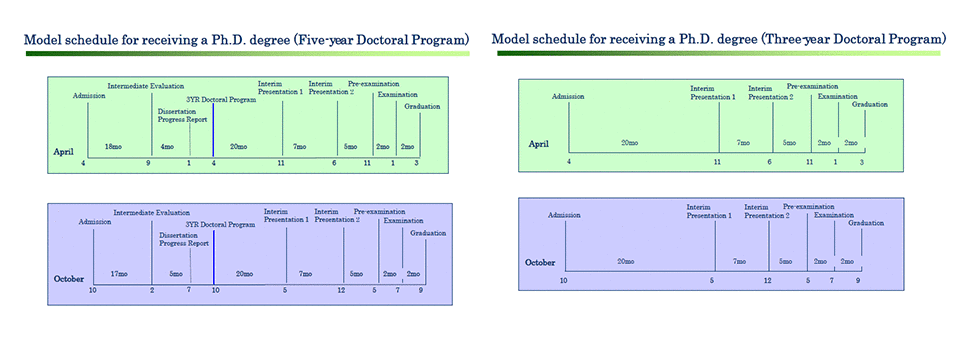GRADUATE Program
Concept of our Graduate Program
The Informatics Program provides a unique educational and research system where the National Institute of Informatics allows students access to advanced IT facilities and leading researchers within an international atmosphere.
In order to pass the Ph.D. program in the Informatics Program students are expected to complete a number of credits from taught courses, to receive the necessary level of research guidance, and to pass a thesis examination. The number of course credits is 16 for the Three-year Doctoral Program, and 42 for the Five-year Doctoral Program.
The duration required for completing the course of study is flexible and might be shortened for students who make excellent progress with their research. For the Five-year Doctoral Program it is possible to be awarded a master’s degree under certain conditions even if a student leaves the university before graduation owing to unavoidable reasons.
Courses in the Informatics Program run in two semesters, Spring (from April through September) and Fall (from October to March) and are taught by leading experts in their respective professional areas. A broad range of subjects are offered covering the entire spectrum of informatics as a multidisciplinary science from basic disciplinary studies such as mathematics, architecture, software, media and intelligent systems to social information and research information. Thus providing graduate students with advanced instruction so that they can become leaders in their fields. Even with the growth of the graduate school since 2002, class sizes are typically small allowing for a personal style of teaching that can be customized to the student’s own research interests.
[Model Schedule]
Foundations of Informatics
Study of the foundations of informatics concerns basic theories. These theories of informatics are profound in themselves and significant for determining and becoming the roots for whole application fields, such as networks, software, artificial intelligence, and information extraction. In particular, this study focuses mainly on basic theories for applying informatics to mathematics for programs, mathematics for numerical computations, mathematics for linguistics, theories of quantum computation, biology, and chemistry. This includes numerical analysis, algorithms, program theory, mathematical logic, mathematical linguistics, quantum computation and communication, bioinformatics, and chemoinformatics.
Information Infrastructure Science
Lectures in information structure science provide details of the theories and technical infrastructure of computer systems and information-communication networks that form the foundations of information systems. As modern information systems are supported by computer system infrastructures and information-communication network infrastructures, this research field comprehensively addresses both infrastructures. Theoretical and practical lectures focus on the technologies of computer architecture, high-performance microprocessors, and processor implementation; the technologies of fault-tolerant system structuring, recovery, error detection, test generation, and formal verification; basic principles and algorithms of communication systems; and performance evaluation methodology and modeling methodology for network design and operation.
Software Science
Software is the foundation of all industries and activities and is increasingly diversified for a knowledge-emergent society, whose key factor is having high quality and highly functional and reliable software. This field addresses the important academic issues of software science, which is indispensable for developing next generation information systems from basic research to application research and from common software technologies (especially program verification), and distributed systems to application software technologies such as data engineering (especially data mining) and signal processing.
Multimedia Information Science
In the age of abundant information, information systems behave as "media" that appropriately offers relevant information to people. This field studies a variety of different problems from this viewpoint: theories and technologies that are necessary for processing target information consisting of different media; theories and technologies as the foundation for efficiently handling large amounts of media information (especially text information); basic technologies for media processing in general, such as pattern recognition and signal processing in general; media processing application examples, such as processing, analyzing, modifying and editing, and presenting information media; and media utility for interactions between people and information systems or among people.
Intelligent Systems Science
The highly sophisticated information society of the 21st century requires every member of society to be able to take advantage of cutting-edge information technology (IT) so that everyone can participate in creating and using information to solve society's problems. To satisfy this requirement, systems that come close to having human information processing capabilities need to be developed; this is the aim of intelligent systems science. The intelligent systems science course offers studies on reasoning science, logical foundations for artificial intelligence, cluster analysis, knowledge sharing systems, intelligent web systems, machine learning, communication environments, interaction in networked 3D virtual worlds, human agent interaction, natural language processing, and intelligent robotics to give students a full understanding of various advanced topics in the field.
Information Environment Science
The information environment is a new concept for viewing the following as a whole: information, information-communication infrastructures, information management, circulation and retrieval systems, people, and social foundations. It has been regarded as an indispensable academic system for achieving the information society. This field sets digital documents and academic information environments as the core subjects and studies the following from the basics to application: digital publications, academic information databases, human environment informatics, information retrieval, information linguistics, and the information society.





